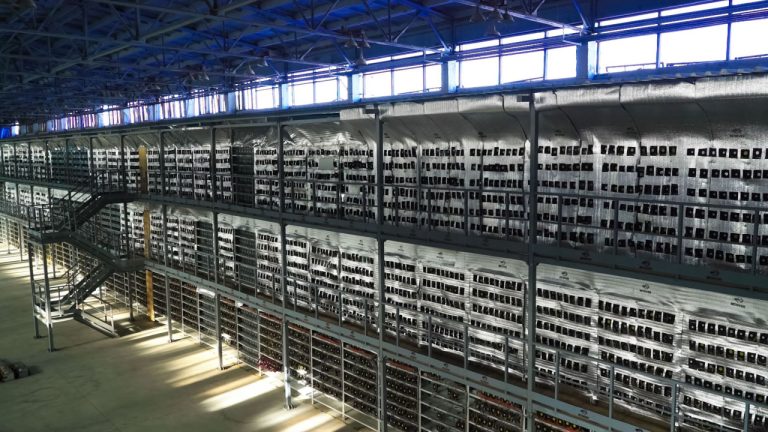 The establishment of Russia’s first mutual investment fund dedicated to financing cryptocurrency mining operations is underway. According to a report by the Russian press, it will be available to qualified investors and will finance the acquisition of coin minting equipment. Russian Crypto Mining Sector to Attract Shareholders Through Investment Fund Work has begun to set […]
The establishment of Russia’s first mutual investment fund dedicated to financing cryptocurrency mining operations is underway. According to a report by the Russian press, it will be available to qualified investors and will finance the acquisition of coin minting equipment. Russian Crypto Mining Sector to Attract Shareholders Through Investment Fund Work has begun to set […] As Ordinal inscriptions approach the 150,000 mark, blocks larger than 3 MB have become commonplace, with many blocks near the 4 MB range. Meanwhile, after the average transaction fee on-chain rose 122% higher at the beginning of February 2023, the average fee has remained the same over the last few weeks and is currently coasting […]
As Ordinal inscriptions approach the 150,000 mark, blocks larger than 3 MB have become commonplace, with many blocks near the 4 MB range. Meanwhile, after the average transaction fee on-chain rose 122% higher at the beginning of February 2023, the average fee has remained the same over the last few weeks and is currently coasting […] Authorities in Abkhazia are stepping up efforts to clamp down on cryptocurrency mining amid electricity shortages in the winter months. The government of the breakaway Georgian region announced it’s also taking measures to prevent imports of mining equipment. Abkhazia Creates Headquarters to Combat Illegal Crypto Mining Operations Police in Abkhazia are conducting daily raids to […]
Authorities in Abkhazia are stepping up efforts to clamp down on cryptocurrency mining amid electricity shortages in the winter months. The government of the breakaway Georgian region announced it’s also taking measures to prevent imports of mining equipment. Abkhazia Creates Headquarters to Combat Illegal Crypto Mining Operations Police in Abkhazia are conducting daily raids to […]
Judicial rulings require Iranian authorities to release a part of the 150,000 crypto mining equipment previously seized due to energy concerns.
Iranian authorities seized numerous crypto mining equipment over the past two years, citing stress on energy grids during winter. Now, a court ordered the release of crypto-mining equipment that was previously seized as a measure to conserve energy.
Since 2021, Iran’s Organization for Collection and Sale of State-Owned Property (OCSSOP) has seized mining equipment — both authorized and unauthorized — due to looming power shortage concerns. However, the authorities had a change of heart amid winter as they ordered the release of the seizure. As explained by Abdolmajid Eshtehadi, the head of Iran's Ministry of Economic Affairs and Finance:
“Currently some 150,000 crypto mining equipment are held by the OCSSOP, a large part of which will be released following judicial rulings. Machines have already been returned.”
However, Eshtehadi believed the recently released mining equipment could add stress to the country’s energy grids. He suggested that the Generation and Transmission Company of Iran (TAVANIR) must propose plans for the use of the hardware to avoid undue stress on the nation's grid system.

Back in June 2022, Iran had to cut the power supply for legal mining firms as the country's electricity consumption recorded an all-time high of 62,500 megawatts (MW) during peak consumption. At the time, Iran used to account for 0.12% of the global Bitcoin (BTC) hash rate, which has now increased to 0.2%, as shown in the above graph.
Iran’s energy concerns become evident when considering the recent laws imposing fine for the illegal use of subsidized energy in crypto mining.
Related: Iran Import Association demands regulatory clarity to use crypto in foreign trade
On the flip side, Denver-based Crusoe Energy aims to help Oman, a gas-rich Middle Eastern country, cut down on gas flaring — the burning of natural gas associated with oil extraction.
Crusoe Energy announced plans to open up a pilot project in Muscat, Oman, to repurpose the gas flaring energy into powering mining computers. This initiative will aid Oman’s goal of zero-gas flaring by 2030.
 The province of Buenos Aires in Argentina will begin taxing cryptocurrency mining and possibly staking, in 2023. A new proposal modifies the tax law to introduce cryptocurrency mining as a taxable activity that will levy 4% on the income calculated via these operations. However, it is still unclear if staking will be taxed. Buenos Aires […]
The province of Buenos Aires in Argentina will begin taxing cryptocurrency mining and possibly staking, in 2023. A new proposal modifies the tax law to introduce cryptocurrency mining as a taxable activity that will levy 4% on the income calculated via these operations. However, it is still unclear if staking will be taxed. Buenos Aires […]
Tony Fadell, the man behind the iPod, iPhone and Nest Thermostat, collaborates with major crypto wallet firm Ledger to build a new cold wallet.
Hardware wallet provider Ledger, known for its cold-storage devices, announced its seventh crypto wallet in collaboration with the creator of the original iPod.
Tony Fadell, the inventor of the iconic iPod Classic model, has partnered with Ledger to help the company design its latest wallet device known as Ledger Stax. The company broke the news on Dec. 6 at Ledger’s bi-annual Web3 developer event, Ledger Op3n, in Paris.
Ledger’s upcoming new hardware wallet is a credit card-size device that features a large E Ink display, capacitive touch, Bluetooth support, wireless charging and more.
For the first time in Ledger's product line, Stax contains a curved E Ink display which can be used to show the holder's name or other wallet information, just like a book spine. The device is also equipped with magnets, allowing users to organize the storage of multiple similar devices and "stack" them in order, and that is why Ledger Stax was called so.
When designing the device, Fadell thought about what the modern stack of cash would look like. “He thought about it in two ways — the spine of the device is like the band around the stack of cash which shows you what's inside, and you can stack them together using the magnets,” a Ledger spokesperson said in a statement to Cointelegraph.

Fadell, who also worked on the first three generations of the iPhone, designed Ledger Stax in cooperation with the industrial design firm Layer. “We need to be user-friendly… no! A ‘user-delightful’ tool, to bring digital asset security to the rest of us, not just the geeks,” the 'Father of the iPod' said.
According to the announcement, Ledger Stax will be available in Q1 2023, and customers can now pre-order the wallet on Ledger’s official website. In the future, it will be available from select retailers such as BestBuy in the United States.
The Ledger Stax wallet is priced at $279, a spokesperson for Ledger told Cointelegraph. The device is significantly more expensive than Ledger’s previous wallet, the Ledger Nano S Plus. Officially released in April 2022, Nano S Plus costs $79 at the time of writing. The previous iteration, Nano X, is priced at $149.
Related: Binance makes moves in hardware wallet industry with new investment
According to Ledger, the latest wallet product is designed to make interacting and signing transactions easier with a touch screen and a larger display. “Ledger Stax adds to our lineup, rather than replacing anything, allowing customers to choose the kind of experience they want,” the firm's representative said.

Miners in Russia have likely been increasingly buying crypto ASICs due to reduced prices of mining devices as well as low-cost energy.
Cryptocurrency miners in Russia appear to be unbothered by the ongoing crisis of crypto mining as the local demand for mining hardware has reportedly been on the surge in Q4 2022.
Some crypto mining hardware distributors in Russia have faced a significant spike in demand for mining-designed application-specific integrated circuit (ASIC) chips, the local news agency Kommersant reported on Dec. 1.
Local dealer Chilkoot reported its ASIC sales in November and October exceeded its entire sales made in Q3. Over the past nine months, the distributor reportedly sold 65% more hardware than in 2021.
“We are working with legal entities, and we see that they began to buy 30% more equipment in one transaction than at the beginning of the year,” Chilkoot development manager Artem Eremin said.
BitRiver, Russia’s largest crypto mining-focused data center facility, has also recorded a notable increase in demand, reportedly seeing 150% growth over the past 10 months.
Russia’s reported surge in demand for cryptocurrency mining hardware comes amid tough times for the mining industry, with total Bitcoin (BTC) mining revenue hitting two-year lows in late November. A number of mining firms — including Argo Blockchain and Core Scientific — have even questioned whether they would be able to continue operations due to massive losses driven by the current bear market in crypto.
Miners in Russia have likely been increasingly hoarding crypto ASICs due to reduced prices of mining devices as well as low-cost energy.
51ASIC co-founder Mikhail Brezhnev reportedly said that Bitcoin mining in Russia can still be profitable despite a massive drop in BTC price this year. According to the executive, the cost of mining 1 BTC at the electricity cost of $0,07 per 1 kilowatt-hour with the most up-to-date equipment can generate roughly $11,000. At the time of writing, Bitcoin is trading at $16,975, down about 70% over the past year, according to data from CoinGecko.
Related: Russian bill would legalize crypto mining, sales under ‘experimental legal regime’
The industrial crypto mining market in Russia has been benefiting from the current market situation, BitRiver’s financial analyst Vladislav Antonov reportedly said. He noted that the demand for ASIC equipment in the wholesale segment increased due to a drop in purchase prices, which have become as close as possible to the cost of production. That is the best entry point for investment, the expert reportedly said.
According to Antonov, a mining entry during a bear market can potentially generate “significant profit of tens of percent” over a three-year period.

The hardware wallet firm is certain that the latest uptick in demand is a result of investors rescuing their funds in the aftermath of the FTX failure.
Amid growing concerns over centralized cryptocurrency exchanges in the wake of the FTX crisis, investors are increasingly moving to hardware crypto wallets.
A major hardware wallet provider, Trezor, has recorded a major uptick in wallet sales in the aftermath of the FTX contagion, the firm’s brand ambassador Josef Tetek told Cointelegraph on Nov. 15.
Trezor saw its sales revenue surge 300% week-on-week and it’s still growing, Tetek reported, adding that the current sales are higher than a year ago when Bitcoin reached its all-time highs at $68,000. Trezor has also recorded a significant spike in its website traffic, which increased 350% over the same period, the exec noted.
According to Tetek, Trezor is quite certain that the uptick in new wallet users was a result of issues with FTX, a crypto exchange at the center of the latest industry scandal involving the misappropriation of user funds. The spike in demand for Trezor wallets started early last week, exactly when “rumors of the FTX insolvency started circulating,” Tetek reported.
Trezor expects further growth in new users in the near future as the failure of middlemen in crypto would only continue to unfold, Tetek suggested, stating:
“We expect this trend to continue in the short to mid term, as the contagion of FTX failure continues to unwind and Bitcoin or cryptocurrency holders lose trust in custodians and finally start to explore their options to self-custody their digital assets.”
According to the executive, Trezor is able to satisfy current levels of demand in the short to medium term. “Even if sales continue at this elevated rate, we are confident there would be a limited impact on our stock in the longer term, as we were already planning for an uptick in sales,” Tetek said. He also noted that Trezor doesn’t plan to increase the prices for its hardware wallets in line with its vision to make “self-custody accessible to all.”
Despite the spike in demand and the associated increase in support requests, Trezor isn't planning to expand its hiring. “We did not have to downscale as we were prepared for a prolonged and deep bear market,” Tetek stated, adding that Trezor currently employs a total of 100 people working in multiple locations, with the majority based in Prague.
Cryptocurrency investors have been increasingly moving to self-custody with software and hardware wallets, with exchange outflows nearing all-time highs by mid-November 2022.
Ledger, a major rival hardware wallet supplier, has recorded a significant surge in demand for its devices recently as well. The French cold wallet firm saw one of its highest traffic days ever shortly after FTX stopped all crypto withdrawals last week, triggering inventors to offload their funds from exchanges to cold storage as soon as possible.
Related: CZ and Saylor urge for crypto self-custody amid increasing uncertainty
Amid the ongoing FTX contagion, even some of the biggest crypto exchanges started promoting the need for self-custody. Binance CEO Changpeng Zhao admitted on Nov. 14 that centralized exchanges may no longer be necessary as investors would shift to self-custodial solutions like hardware or software wallets.
“If we can have a way to allow people to hold their own assets in their own custody securely and easily, that 99% of the general population can do it, centralized exchanges will not exist or probably don’t need to exist, which is great,” the CEO said.

Some Ledger users weren’t able to process withdrawals using Ledger Live on Wednesday, according to social media reports.
Hardware-based cryptocurrency wallet provider Ledger has experienced some issues due to massive outflows from crypto exchanges amid the FTX bloodbath, according to its chief technology officer.
Ledger saw a “massive usage” of their platforms and suffered a “few scalability challenges” on Nov. 9, Ledger CTO Charles Guillemet reported in a statement on Twitter.
Guillemet reasoned Ledger’s issues by the outcomes of the ongoing crisis of a major global cryptocurrency exchange, FTX. The CTO said that crypto investors have been increasingly offloading their holdings from crypto exchanges to Ledger, stating:
“After the FTX earthquake, there's a massive outflow from exchanges to Ledger security and self sovereignty solutions.”
According to Guillemet, Ledger should have resolved the outages as of 5:30 am UTC.
Ledger first reported the wallet issues on Nov. 9 at around 11:00 pm UTC, officially announcing that its hardware wallet interface application Ledger Live was experiencing downgraded server performance.
“Specific issues may vary, including connecting to the My Ledger tab and performing a Genuine Check,” Ledger said in a tweet, adding that the client’s assets were safe.
The hard wallet company subsequently took to Twitter to announce that it fixed the server outage in about one hour after detecting the issue. “Our server outage has been resolved and all systems are operational,” Ledger said, adding that their server outage was resolved and all systems were operational.
Previously, Ledger Support also announced that it also temporarily paused FTX and FTX.US swaps on Ledger Live. Ledger launched the swap integration with FTX in July 2022.
According to Ledger's Twitter thread, the outages caused some users to be unable to send any transactions using Ledger Live, including withdrawals.
The crypto community was quick to react to the issues despite many staying confident about Ledger’s operations amid the larger market issues. Some industry observers criticized Ledger for choosing the wrong wording to communicate with their customers amid the ongoing issues at FTX. People apparently got triggered by Ledger’s wording “assets are safe” as FTX founder Sam Bankman-Fried made a similar statement on Twitter on Nov. 7, only to delete it a day after.
“FTX is fine. Assets are fine,” Bankman-Fried declared in his tweet, just hours before the exchange stopped all crypto withdrawals after becoming unable to process such transactions.
It appears to be unclear whether the latest issues on Ledger Live were the first time for the platform to experience issues of such a scale. The firm did not immediately respond to Cointelegraph’s request for comment.
Related: FTX and Binance’s ongoing saga: Everything that’s happened until now
The crisis of FTX is by no means the first incident that might have triggered crypto users to think about moving their assets to cold storage to better protect their funds. The concept of hardware or cold wallets has been growing increasingly popular this year, as major centralized crypto exchanges limit access to funds of some users over various types of issues.
A major rival cold wallet provider, Trezor, has not recorded any issues due to the FTX issues so far, Trezor executive Josef Tětek told Cointelegraph. "The only way to avoid these massive blow-ups is to understand self-custody as a necessity," the exec stated. "Not an option; a true necessity," he emphasized.
Despite self custody being associated with its own set of risks, many crypto people, including Tether and Bitfinex CTO Paolo Ardoino, still recommend users “always to self custody in cold storage” if they want to hold their Bitcoin (BTC) and crypto.
 Miners in Vietnam have expressed grievances over the loss of business following Ethereum’s transition to a consensus mechanism that does not require the energy-intensive computing they were providing. Many are in trouble, local media reported, quoting entrepreneurs and mining enthusiasts. Cryptocurrency Miners Hit by The Merge, Vietnam Report Reveals Vietnam’s crypto miners have suffered heavy […]
Miners in Vietnam have expressed grievances over the loss of business following Ethereum’s transition to a consensus mechanism that does not require the energy-intensive computing they were providing. Many are in trouble, local media reported, quoting entrepreneurs and mining enthusiasts. Cryptocurrency Miners Hit by The Merge, Vietnam Report Reveals Vietnam’s crypto miners have suffered heavy […]